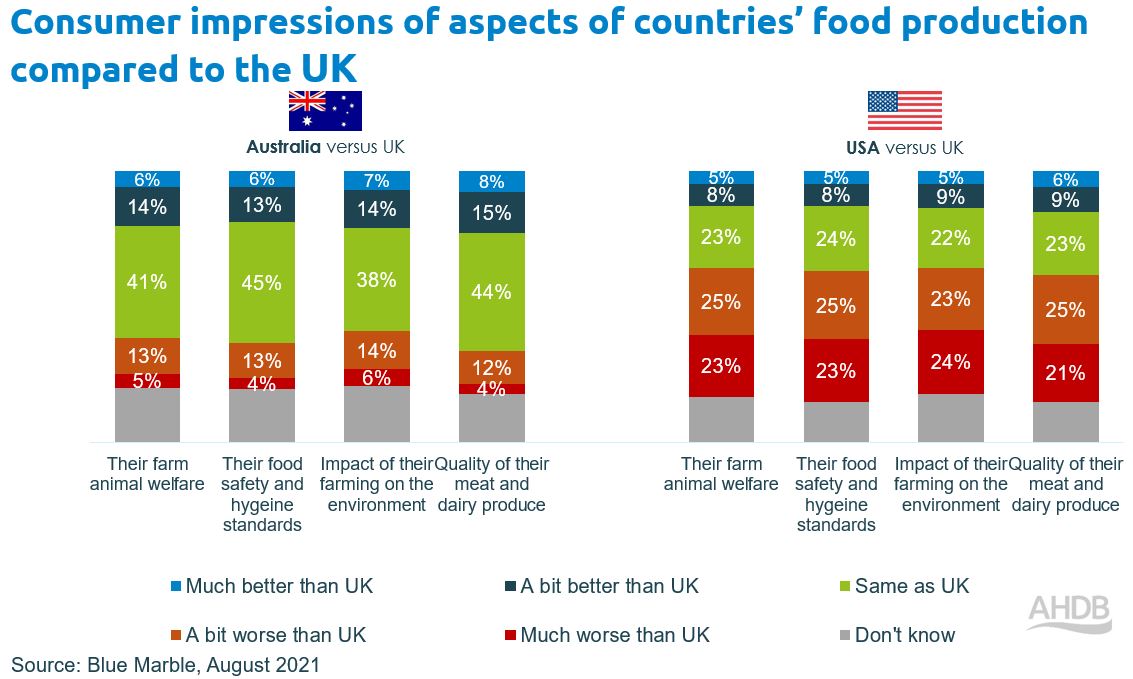Consumer views of trade deals
Friday, 24 September 2021
Since the UK exited the EU, new and potential trade deals have been highlighted in the news, often featuring negative headlines, such as lower animal welfare standards and the use of EU banned pesticides in food production overseas. But what do UK consumers really think, and are they likely to buy these imported products if they made it into our supermarkets and restaurants?
What do consumers think?
A recent study by Which? found over two thirds (67%) of UK consumers felt the public are ‘kept in the dark’ when it comes to trade deals (Which, June 2021). At the same time negative news stories on animal welfare and food production standards overseas have amplified consumers concern over food standards, with 87% of Brits agreeing that all food imports should align with domestic food standards (Which, June 2021).
How will trade deals affect consumer purchases?
Results from our research with YouGov (August 2021) show that 64% of consumers are likely to purchase meat labelled as produced in Ireland, if sold at the same price as British-produced meat in the supermarket or at a restaurant. In contrast only 12% of consumers are likely to purchase meat produced in the USA, and 28% if produced in Australia.
The UK has a long-standing trading relationship with Ireland, and consumers are used to seeing meat and dairy products from Ireland on retailer shelves. Irish food is produced to EU standards which, at present, are closely aligned to UK domestic standards, so it is likely consumers place more trust in the trading relationship with Ireland compared to the potential US and Australian trade deals on the cards. Negative media stories about specific markets standards can be very influential on consumer perceptions.
A recent AHDB study ran by Blue Marble (August 2021), found that when comparing aspects of US and Australian food production to the UK’s, consumer perception of US food production was worse than that of Australian food production. For instance, 48% of consumers believe US animal welfare standards are worse than the UK, compared to only 18% of consumers when considering Australian standards. In addition, 46% of consumers believe the quality of US meat and dairy produce to be worse than the UKs, whereas only 16% felt similar when regarding Australian products.
Furthermore, 48% of consumers agreed it would be very beneficial to have on-pack labelling which states how and where the animals were reared, allowing consumers to make an informed purchase decision (Blue Marble, August 2021).
It’s important to put these findings into context. There are multiple factors that can impact consumer choice at point of purchase. Previous AHDB research identified that country of origin and animal welfare standards often sit further down the list of requirements for shoppers, with aspects such as price, taste, and convenience taking priority. Therefore, British consumers may be more likely to purchase US or Australian meat in retail if the product meets certain criteria, such as a lower price point than UK domestic product.
What does this mean?
Overall, it is clear that many consumers have concerns over lower-quality food products being imported to the UK, with that concern being higher for US food products than their Australian equivalents. It is likely that negative news stories are having an impact on consumer views.
It’s important to recognise that this doesn’t necessarily mean that consumers won’t buy these products. US and Australian exporters may be able to allay concerns by meeting UK standards, and communicating with consumers, particularly if factors such as price come into play in a recession.
Another factor to bear in mind is that whilst labelling of country of origin is commonplace in retail, when it comes to the food service sector, we know that it rarely appears on menus. As such consumers dining out are less likely to be aware of the origin of what they are eating.
Topics:
Sectors:
Tags:


